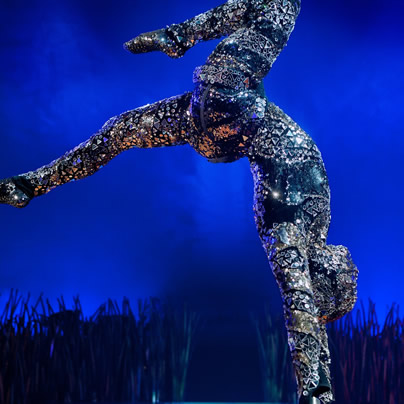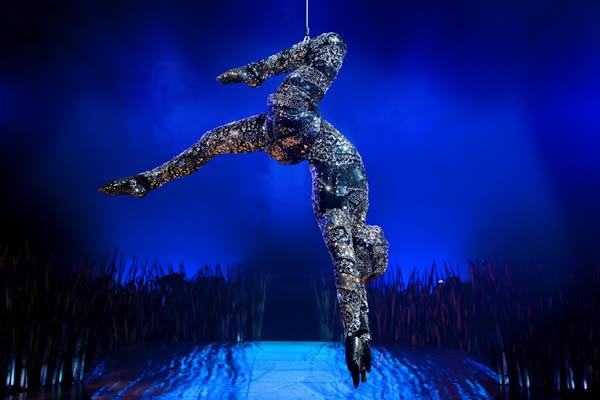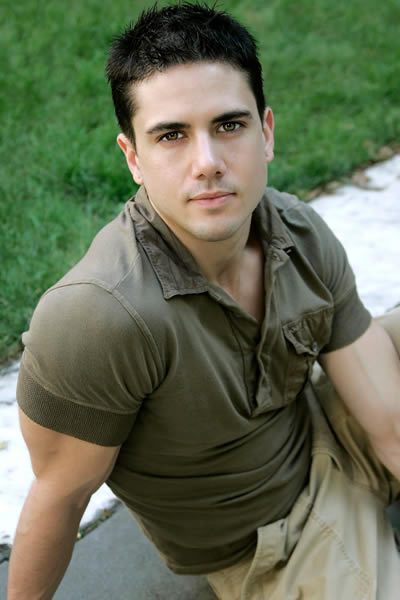Arts & Entertainment
Return to form
Gay Cirque performer in peak shape after conquering addictions


Joe Putignano says his passion for gymnastics never went away. Even in the throes of heroin addiction, he replayed his old routines in his mind. (Photo courtesy Cirque du Soleil)
Cirque du Soleil’s ‘Totem’
Aug. 15-Sept. 30
Plateau at National Harbor
201 Harbor View Ave.
Tickets: $40-$153
cirquedusoleil.com
Cirque du Soleil gymnast Joe Putignano prepares for his character in the big top show “Totem” by donning a dazzling costume containing eight pounds of Swarovski crystals. When he enters the arena, he descends from the ceiling illuminated in light.
“Totem,” which opens at the National Harbor on Wednesday, is a story about evolution, combining the scientific theories and myth that humans have developed about it. Putignano’s character, the Crystal Man, is the spark of hope and light that begins the journey. He says the character embodies Charles Darwin’s quote, “Light will be thrown on the origin of man.”
As he performs, audience members can sense the intensity and passion in the movement of his body. Company manager Jeff Lund describes him as a “human disco ball.” Putignano says, “It is difficult, performing in a heavy costume is like running a small machine and it does take a lot of practice.”
However, the audience will not realize that less than 10 years ago, the spark in Putignano’s life almost went out. At age 17, he began using various drugs, including ecstasy, cocaine and later heroin, and would not be clean again until he was around 29. When he was 19, he quit gymnastics thinking he would never return to the floor.
“I felt I betrayed myself,” he says. “I never wanted to do a handstand or a split again. It was like a divorce.”
Lund, who has worked with Putignano for almost two years and is in charge of almost all aspects of “Totem,” says Putignano’s performances these days defy his background.
“He is a world-class athlete,” he says. “His story is a very inspiring one.”
Putignano began gymnastics when he was around 8 years old, after watching the Olympic gymnasts compete on television. He says as he watched them, he knew he wanted to be doing this for the rest of his life.
He was immediately very good and began competing around the U.S. and went to the Olympic Training Center in Colorado Springs twice when he was 11 and 13.
“As a child you bend to the laws of passion,” Putignano says. “You can’t imagine as many people as passionate as you. Later you see that it is a sport and there are rules, and now everybody sees your imperfections.”
As a Boston native, he says competing in New England is different from competing with top gymnasts from around the country. For a young Putignano, the mounting pressure to reach perfection and to compete began to wear on him. Especially, as he describes, an injury can completely derail a gymnast from his path very quickly.
“We know that our art form is fleeting, we can’t take it for granted because it can leave you in a moment,” he says.
He says growing up with gymnastics made it feel like his church. Though he did not come out until he was 19, being gay and a gymnast was never an issue for Putignano. He says, “The floor has no sexuality.” But the increased competition felt like a violation of his sacred space.
Putignano began taking ecstasy and cocaine during the “’90s rave era” and eventually quit gymnastics when he was a sophomore in college.
“To be a gymnast, one has to conquer perfect precision and control over the physical capacities of the body,” he says. “To be an addict, one must surrender this control over to the underworld, and I couldn’t keep them both together.”
After walking away from competing, Putignano plunged into what would turn out to be a very dark 10 years. He moved to New York in 1999 and began using heroin. He says his experiences with the drug were full of “bitter irony.”
“The more I shot up to escape the memories of my once beautiful pure sport, the quicker I nodded out into a dreamscape of performing my old gymnastics routines,” he says. “I was shooting up to escape the memory of my failed destiny, only to be flooded into an unconscious heroin state where I performed my gymnastics skills over and over. If there was ever a layer of Dante’s inferno, this was it.”
In New York City, he worked various jobs like waiting tables and modeling. He tried to stop several times with no success.
“Eventually, I was getting older and hadn’t gotten any better and over the years I saw the tiny spark of light inside me dimming down to nothing,” he says. “That one thing which made me myself was going to burn out forever. The fear of losing this light kept me constantly chasing sobriety.”
As time went on, Putignano ended up homeless and overdosed twice where he was declared dead both times.
“At the time of my overdoses, I was so far from reality that I was actually strengthened by my experience because I believed I had beat death,” he says.
This cycle continued until he was 26, when he was in rehab for the fifth time. One day, he went up into his room and began doing headstands. Though it would be another three years before he was completely clean and intense training was required to get back in shape, his interest was rekindled. But sobriety did not come easily.
“When I started to audition for shows, I was still not completely clean,” Putignano says. “I would be three months clean and relapse.”
Putignano’s second chance in gymnastics came when he got clean and began performing at the Metropolitan Opera House and Broadway Bares. A pivotal turning point came for him when he was eventually hired by Twyla Tharp to perform in her Broadway show “The Times They Are A Changin,’” based on Bob Dylan’s music. This was important to Putignano, as he was rejected from the show twice before being hired.
“It was such an important point in my sobriety. Tharp is an icon in the dance world,” he says.
While performing on Broadway and the Opera house, he connected with Robert Lepage, one of the creators of Cirque du Soleil. Lepage knew Putignano’s background and asked him if he would like to be part of show. Putignano says it is not a coincidence that his character should represent hope and light in the world.
“For myself, my character represents my sobriety, my hope, my faith and the relentless power of the human spirit,” he says.
Now six days a week, he brings that light to others through the 4,000 pieces of reflective glass. And just like Putignano, Lund says the costume is far more durable than it seems.
“At the end of the night, it gets thrown in the wash with everything else,” he says. “Sometimes pieces will fall off, but we have people who will reattach them when it happens.”
With a tight performing schedule and around six years of sobriety under his belt, Putignano says remaining sober is still a challenge.
“I would love to say that touring has been easy for me in sobriety, but the truth is, it isn’t,” he says. “Some humans are like trees and they need to stay close to their roots. My sober network is in New York City and it has been difficult without them.”
Despite the challenge, he has remained clean so far and he is able to use his experiences to be an emotional support for other performers. He says since he has been in dark places himself, he can be empathetic to others’ emotional struggles.
Lund describes the “Totem” performers and crew as one big family. Nationality and sexuality do not matter there, he says.
“For me as a manager, I try to avoid making lines between artists and technicians and so on, “ he says. “I know in other companies it may be like that, but I like my entire crew to be connected with each other. This is made easy since we are on the road together for so much out of the year.”
What keeps Putignano going is the thought that many who have been in his position have not received a second chance.
“I have to continue to carry the torch for the dead, for those who didn’t get a second chance and I have to do everything in my power to bring hope to the hopeless,” he says. “I was once the hopeless.”
Another Cirque show to open in Baltimore
“Dralion,” Cirque du Soleil’s acrobatic show that fuses influences from the East and the West, is opening in Baltimore on Aug. 22 and runs through Aug. 26.
The name of the show represents the different parts of the world combined— it’s the combination of the dragon, representing the East, and the lion, representing the west. It mainly draws on the 3,000-year-old tradition of Chinese acrobatics combined with the more modern Cirque du Soleil twist, according to the website.
In the show, the four elements of nature come to life. At first they are separated and have their distinct colors. Air is blue, water is green, fire is red and earth is ochre. When they are combined balance is achieved.
“Dralion” is one of Cirque du Soleil’s arena shows, and is performing at the 1st Mariner Arena (201 West Baltimore St.) Tickets range from $40 to $165. For more information, visit cirquedusoleil.com.
Theater
‘Bad Books’ a timely look at censorship in local library
Influencer vs. conservative parent in Round House production

‘Bad Books’
Through May 4
Round House Theatre
4545 East-West Highway
Bethesda, Md.
Tickets start at $43
Roundhousetheatre.org
While a library might seem an unlikely place for a heated contretemps, it’s exactly the spot where adults go when they’re itching to battle out what books minors might be allowed to read.
In Sharyn Rothstein’s “Bad Books,” two women, The Mother (out actor Holly Twyford) and The Librarian (Kate Eastwood Norris), swiftly become mired in a quarrel that comes with some weighty repercussions.
The Mother is a popular conservative influencer on a mission. She’s furious that the local library has overstepped its bounds and she blames The Librarian, a woman who adheres to the “it takes a village” method of child rearing and is dedicated to the young people who approach her reference desk.
There’s some background. It seems The Librarian who dresses young (tight jackets and Doc Martens) and curses a blue streak, forged a friendship with Jeremy, a teenage library regular.
While the details are a bit hazy, it seems the troubled Jeremy confided in The Librarian regarding some personal issues. In return, she suggested a helpful book – Boob Juice.
Unsurprisingly, based solely on its title, the book has thrown The Mother into a pique of outrage. After finding Boob Juice in her son’s bedroom, she made a beeline to the library; and not incidentally, The Mother hasn’t read the recommended work and has no plans to do so.
Set in a suburb with lax gun laws, the story explores facets of division and conciliation. The Mother insists she isn’t so much about banning books as she is keeping some books away from young people until they’ve obtained parental approval.
“Bad Books” is performed in the round. Built on a rotating stage, Meghan Raham’s set is simple, pleasingly serviceable, and easily transforms from the library into a small corporate office, and later the assembly room of a church. Overhead floats a circular glass shelf filled with a cache of banned books. Things like a rolling book cart and a goldfish bowl add some flavor to the different locations.
The Mother wasn’t always a popular conservative warrior with an enthusiastic horde of followers.
Her past includes penning a book that later filled her with guilt and regret. She refers to that early questionable literary accomplishment as her bad book. And while over the years, she has persevered to find and destroy each and every printed copy, she hasn’t entirely succeeded.
Norris plays three women who figure meaningfully into the arc of Twyford’s mother character. In addition to The Librarian, Norris is The Manager, a broadly played piece of comic relief, and The Editor, a warm woman who reveals things about Jeremy that his own mother never knew.
Smartly staged by Ryan Rilette, the production is part of a National New Play Network Rolling World Premiere. While Rothstein’s script offers two strong roles (skillfully performed by celebrated actors Twyford and Norris), its ending feels too neatly resolved.
In the past, Twyford and Norris have successfully joined forces for numerous DMV productions including Studio Theatre’s production of David Auburn’s two-hander “Summer, 1976,” the story of a longtime and unlikely friendship between two women who meet as young mothers during the Bicentennial summer.
Though different, both The Librarian and The Mother share a strong and ultimately hopeful relationship with words.
There’s a quote from E.B. White’s classic “Charlotte’s Web” that pops up a couple of times in the briskly paced 80-minute play. Charlotte, the wise spider, says, “with just the right words you can change the world.”
Books
‘Pronoun Trouble’ reminds us that punctuation matters
‘They’ has been a shape-shifter for more than 700 years

‘Pronoun Trouble’
By John McWhorter
c.2025, Avery
$28/240 pages
Punctuation matters.
It’s tempting to skip a period at the end of a sentence Tempting to overuse exclamation points!!! very tempting to MeSs with capital letters. Dont use apostrophes. Ask a question and ignore the proper punctuation commas or question marks because seriously who cares. So guess what? Someone does, punctuation really matters, and as you’ll see in “Pronoun Trouble” by John McWhorter, so do other parts of our language.

Conversation is an odd thing. It’s spontaneous, it ebbs and flows, and it’s often inferred. Take, for instance, if you talk about him. Chances are, everyone in the conversation knows who him is. Or he. That guy there.
That’s the handy part about pronouns. Says McWhorter, pronouns “function as shorthand” for whomever we’re discussing or referring to. They’re “part of our hardwiring,” they’re found in all languages, and they’ve been around for centuries.
And, yes, pronouns are fluid.
For example, there’s the first-person pronoun, I as in me and there we go again. The singular I solely affects what comes afterward. You say “he-she IS,” and “they-you ARE” but I am. From “Black English,” I has also morphed into the perfectly acceptable Ima, shorthand for “I am going to.” Mind blown.
If you love Shakespeare, you may’ve noticed that he uses both thou and you in his plays. The former was once left to commoners and lower classes, while the latter was for people of high status or less formal situations. From you, we get y’all, yeet, ya, you-uns, and yinz. We also get “you guys,” which may have nothing to do with guys.
We and us are warmer in tone because of the inclusion implied. She is often casually used to imply cars, boats, and – warmly or not – gay men, in certain settings. It “lacks personhood,” and to use it in reference to a human is “barbarity.”
And yes, though it can sometimes be confusing to modern speakers, the singular word “they” has been a “shape-shifter” for more than 700 years.
Your high school English teacher would be proud of you, if you pick up “Pronoun Trouble.” Sadly, though, you might need her again to make sense of big parts of this book: What you’ll find here is a delightful romp through language, but it’s also very erudite.
Author John McWhorter invites readers along to conjugate verbs, and doing so will take you back to ancient literature, on a fascinating journey that’s perfect for word nerds and anyone who loves language. You’ll likely find a bit of controversy here or there on various entries, but you’ll also find humor and pop culture, an explanation for why zie never took off, and assurance that the whole flap over strictly-gendered pronouns is nothing but overblown protestation. Readers who have opinions will like that.
Still, if you just want the pronoun you want, a little between-the-lines looking is necessary here, so beware. “Pronoun Trouble” is perfect for linguists, writers, and those who love to play with words but for most readers, it’s a different kind of book, period.
The Blade may receive commissions from qualifying purchases made via this post.

Friday, April 18
“Center Aging Friday Tea Time” will be at 2 p.m. on Zoom. This is a social hour for older LGBTQ+ adults. Guests are encouraged to bring a beverage of choice. For more details, email [email protected].
Go Gay DC will host “LGBTQ+ Community Social in the City” at 7 p.m. at Hotel Zena. This event is ideal for making new friends, professional networking, idea-sharing, and community building. This event is free and more details are available on Eventbrite.
Trans and Genderqueer Game Night will be at 6 p.m. at the DC Center for the LGBT Community. This will be a relaxing, laid-back evening of games and fun. All are welcome and there’ll be card and board games on hand. Feel free to bring your own games to share. For more details, visit the DC Center’s website.
Saturday, April 19
Go Gay DC will host “LGBTQ+ Community Brunch” at 11 a.m. at Freddie’s Beach Bar & Restaurant. This fun weekly event brings the DMV area LGBTQ+ community, including Allies, together for delicious food and conversation. Attendance is free and more details are available on Eventbrite.
LGBTQ People of Color Support Group will be at 7 p.m. on Zoom. This peer support group is an outlet for LGBTQ People of Color to come together and talk about anything affecting them in a space that strives to be safe and judgement free. There are all sorts of activities like watching movies, poetry events, storytelling, and just hanging out with others. For more information and events for LGBTQ People of Color, visit thedccenter.org/poc or facebook.com/centerpoc.
“Spark Sapphic Social” will be at 8 p.m. at Spark Social House. This weekly sapphic social is an opportunity to mix and mingle with other sapphics in D.C.’s newest LGBTQ bar. This event is free and more details are available on Eventbrite.
“DC Drag Brunch on Rooftop – Penthouse (Formerly at Lima Twist)” will be at 12 p.m. at Baby Shank Rooftop. Hosted by Miss Capital Pride, this is the ultimate drag brunch experience in Washington, D.C., featuring the fiercest queens around. Prepare to be entertained by glamorous drag queens and celebrated celebrity impersonators, including Taylor Swift, Lady Gaga, Beyoncé, Britney Spears, Nicki Minaj, Ariana Grande, Whitney Houston, Cher and many more. Tickets cost $27 and are available on Eventbrite.
Sunday, April 20
Queer Crayon Club will host “Queer Sketch Social” at 3 p.m. at Sinners and Saints. This is a fun event for LGBTQ+ adults to come together and color. Attendance is free and more details are available on Eventbrite.
Monday, April 21
“Center Aging Monday Coffee & Conversation” will be at 10 a.m. on Zoom. This is a social hour for older LGBTQ+ adults. Guests are encouraged to bring a beverage of choice. For more details, email [email protected].
Tuesday, April 22
Genderqueer DC will be at 7 p.m. on Zoom. This support group is for people who identify outside of the gender binary. Whether you’re bigender, agender, genderfluid, or just know that you’re not 100% cis – this is your group. For more details, visit www.genderqueerdc.org or Facebook.
Coming Out Discussion Group will be at 7 p.m. on Zoom. This is a peer-facilitated discussion group and a safe space to share experiences about coming out and discuss topics as it relates to doing so. For more details, visit the group’s Facebook.
Wednesday, April 23
Job Club will be at 6 p.m. on Zoom. This is a weekly job support program to help job entrants and seekers, including the long-term unemployed, improve self-confidence, motivation, resilience and productivity for effective job searches and networking — allowing participants to move away from being merely “applicants” toward being “candidates.” For more information, email [email protected] or visit thedccenter.org/careers.
Asexual and Aromantic Discussion Group will be at 7 p.m. on Zoom. This is a space where people who are questioning this aspect of their identity or those who identify as asexual and/or aromantic can come together, share stories and experiences, and discuss various topics. For more details, email [email protected].
Thursday, April 24
Virtual Yoga with Sarah M. will be at 7 p.m. on Zoom. This is a free weekly class focusing on yoga, breath work, and meditation. For more details, visit the DC Center for the LGBT Community’s website.
DC Anti-Violence Project Open Meeting will be at 7 p.m. on Zoom. This meeting is open to anyone interested in learning more and getting involved in lessening violence both within and directed towards the LGBT communities. For more information, visit Facebook or Twitter.
-

 State Department4 days ago
State Department4 days agoHIV/AIDS activists protest at State Department, demand full PEPFAR funding restoration
-

 Brazil4 days ago
Brazil4 days agoUS lists transgender Brazilian congresswoman’s gender as ‘male’ on visa
-

 District of Columbia4 days ago
District of Columbia4 days agoCapital Pride wins $900,000 D.C. grant to support WorldPride
-

 Mexico3 days ago
Mexico3 days agoGay couple claims Puerto Vallarta wedding venue discriminated against them











